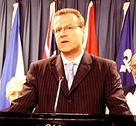Ontario MP Borys Wrzesnewskyj has introduced a ground-breaking piece of legislation aimed at deterring Canadians from undergoing organ transplants involving organs that were purchased or stolen.
 |
| Canadian MP Borys Wrzesnewskyj (The Epoch Times) |
In its first reading, Bill C-500 would make it illegal for Canadians to get an organ transplant abroad if the organ was purchased or taken from an unwilling victim.
"This is the first piece of legislation that specifically addresses the horror of illegal harvesting and trafficking of organs and body parts," Wrzesnewskyj said in an interview with Epoch Times media partner, New Tang Dynasty TV.
He said that the lack of legislation and increasing reports around the world of organ trafficking or harvesting (killing people for their organs) pushed him to draft the bill.
Years ago Wrzesnewskyj was shocked to hear of an orphanage in the Ukraine that was sacrificing children so their organs could be sold. Later, reports of poor Indian farmers and workers selling their organs for the price of a taxi cab pushed him further.
Reports in 2004 revealed that in some villages in Pakistan, as many as half the people have sold a kidney in the hope of escaping poverty. Some are left permanently disabled by health complications.
Wrzesnewskyj said the final push to act came in the form of a report titled "Bloody Harvest" by two Canadian authors, former Canadian MP and Secretary of State David Kilgour and highly regarded human rights lawyer David Matas.
The 2007 report detailed an array of evidence that strongly suggests the Chinese communist regime is killing thousands of Falun Gong practitioners held in detention and selling their organs in lucrative transplant deals. The report found that Canadians are among the developed world "customers" who travel to China for transplants.
"There was a realisation that we have to do something," said Wrzesnewskyj about the trade in human organs. "Canada has to be in the forefront. Canada has an incredible reputation in addressing this sort of question."
The legislation itself was laborious to write. Wrzesnewskyj said he began working on it with legal staff and researchers in the House of Commons last summer. The bill went through 12 drafts before being introduced.
He is aware the government may fall before Bill C-500 becomes law but said if that happens it can be re-introduced. He also hopes it will inspire other countries to follow suit.
"It is accessible now to legislators of any country in the world if they are concerned about this issue ... There might be some fine tuning involved [to use the legislation in other countries], but there is a template that can be applied in most of our western democracies," he said.
Bill C-500 aims to treat organ theft or trafficking as a very serious crime, on a level with murder, said Wrzesnewskyj. Minimum sentences are five years and the maximum is life. The legislation would require each organ recipient to prove their organ was obtained ethically from a willing donor.
The bill would also ban people from other countries from entering Canada if it is known they participated in the illicit organ trade. That would include middlemen who purchase organs from impoverished farmers or doctors in Chinese military hospitals performing transplants with organs taken from murdered Falun Gong practitioners.
He pointed out that politicians of any stripe have reason to support the bill and that it is not a partisan issue.
"This is a question of humanity," he said.
Wrzesnewskyj added that as an MP he is among the few people who can really affect the practice of organ trafficking and harvesting.
"I am compelled not just personally, but on behalf of the people that I represent, to do whatever I can and to stop this sort of horror from occurring."
He encouraged people in support of Bill C-500 to tell their elected officials that they want it to pass quickly.
Published on February 21st, 2008
http://en.epochtimes.com/news/8-2-21/66330.html
* * *
You are welcome to print and circulate all articles published on Clearharmony and their content, but please quote the source.










 more ...
more ...